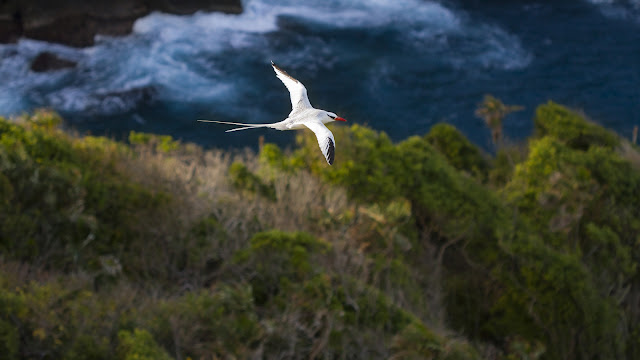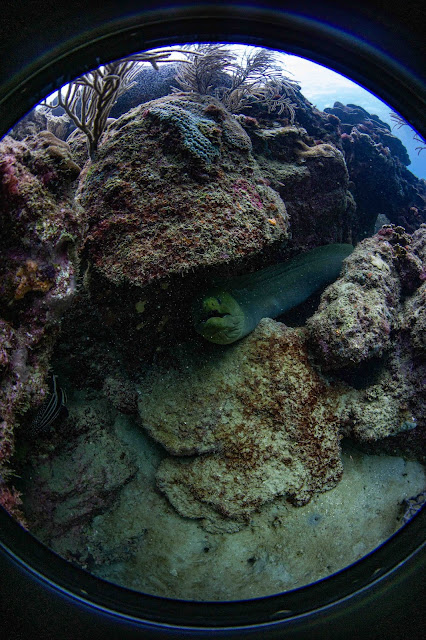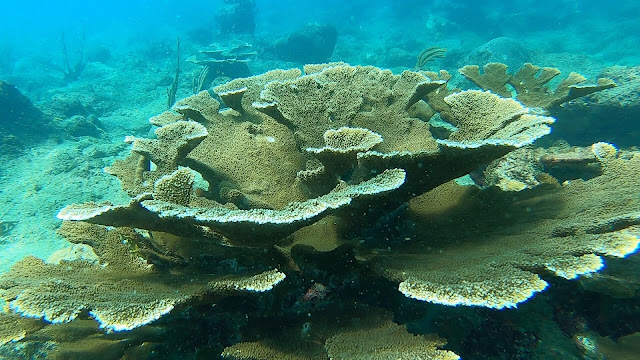The Conscious Fisher
Lehron Narell Brooks is more than your average Tobago fisherman; he is a conscious fisher. When he fishes, he takes selectively, choosing size and species of fish. He is a self-taught free-diver and spear-fisher, with incredible eyesight; a good instinct for finding fish; and lightning reflexes. He has fished above and under water, and is distressed by the declining stock. Soon, he thinks he may turn to charter boating or art. Drawing has been his love since secondary school, but it’s the freedive fishing that gives him a charge. It’s clear though that his first love is Ayla his four-year-old daughter who is inspiring many drawings. (As told to Pat Ganase)
First wahoo, 48 lbs, St Giles Island, September 2015, underwater photo by Richard Parkinson
When I was 12, I had a makeshift spear gun and some swimming goggles. The first time I went under was nothing. I could barely hold my breath and it took a lot of dives to catch a fish.
Over time, I got some small fish and slowly started getting better equipment. I have uncles on both sides who used to spear fish. My Dad, Pat Brooks, was a welder; and my mother Brenda Kerr Adams, a seamstress. I have lived all my life in Roxborough, the third child; I have one sister, the eldest, one older brother and one younger brother. I was practically born in the sea and grew up on the beach; my backyard is the sea all around Tobago.
There are quite a few free diving spearfishermen. It’s something that has started catching on. And you can take freediving courses that make sure you learn safety, and teach you techniques for holding your breath. When I started, I would go under maybe 30 seconds at a time: I would go down and back up quick in maybe ten feet of water. I learned from the internet and youtube. And now I can hold my breath significantly longer. Moving around in clear water, I can stay down for a bit over two minutes; but a lot depends on the quality of the water.
From my 17 years diving and fishing, there are a few rules: Never dive alone; always dive with a buddy. Always. It’s better to dive one day, rest one day. Avoid back-to-back days diving.
Drink as much water as you can; stay hydrated. You might think you are in water but you also need to get water inside. On the water, I eat not to be hungry: nuts and dried fruit don’t make you too full.
On a given fishing day, I am on the sea from 8 to 5. We usually go out with a boatman and two divers, both diving at the same time. We need to bring in at least 100 pounds of fish each. The water must be crystal clear for me to dive. On a really good day, I might be able to bring in 300 pounds from spear fishing. Remember that fish move with the tide and the moon. Unless they are very big fish – and those are fewer now – you are talking about maybe five dives to bring up an average 20-pound fish on each dive; more dives if the fish are smaller.
African Pompano, 8 lbs, off East Tobago, August 2019
Lionfish, Arnos Vale, August 2017
Horse eyed jack, 26 lbs, off East Tobago, December 2018
Cubera Snapper, 45 lbs, South Atlantic, June 2017, photo by Jack Azar
Barracuda, 40 lbs, off East Tobago, April 2020
First wahoo
The first time I shot a wahoo, it was a complete surprise. That was five years ago. We usually leave from Roxborough and move around the island, diving in places where we expect to find fish. That time, we were off St Giles in a snapper bank in fairly shallow water. The wahoo came up out of nowhere and I was in the right place and ready. It was the best feeling in my life. And I am always on the lookout for wahoo.
I gravitated towards spearfishing but I see myself as a fisherman. I fish most days, weather and tide permitting; and dive every other day. There is a spearfishing season, when the water is clear and clean. Growing up the water was good in December and August. But times are changing and anything is happening anytime. Now, you have to check when you wake up. You can’t tell from one day to the next if the water is going to be clear. I don’t know what accounts for this. The outflow from the Orinoco is not clean anymore*; I am not sure if it is pollution or climate change or what. Since I started diving, the fish are also getting fewer; I would say they have decreased by more than 50 percent. (*Note: illegal mining in Venezuela since 2016 is polluting many rivers which flow towards our islands.)
First wahoo, 48 lbs, St Giles Island, September 2015, photo by Richard Parkinson
Charter boat fishing
Eventually, I want to move away from commercial fishing to do charter fishing with a boat. That’s the way to save our fishing grounds. Freediving spearfishing is the most sustainable fishing method. We target specific sizes and particular species. We look for barracuda, cavali, snapper and grouper. Mahimahi (dolphin) are smaller now and showing up fewer times a year. Wahoos are decreasing – in size and numbers – even more than dolphins. It’s years since we’ve seen flying fish spawning. The lionfish have moved in. They grow very large, fully adapted to our waters; we can’t get rid of them. I used to hunt them and was stung. It is the worst pain; now I stay clear of them.
With a boat, I would take visitors around the island and for fun fishing. My ambition is to build my own boat to use for chartering. I’m still designing it – a 23-foot pirogue with hand-laid fiberglass hull. A lot depends on the world after Covid-19. And of course, I’ll take Ayla, she’ll be the first mate! I try my best to let Ayla experience some of the things I did as a kid. I take her to beaches and rivers, we catch and cook fresh fish, we pick and eat fresh fruits. It makes me happy to see that she not only shows interest, but really enjoys it!
At the end of the day, I am a fisherman. There’s nothing else I want to do more than that. I enjoy living off the sea. If I have to do some other things to ensure that I can still do that, so be it. My art is a hobby; I may not be able to live off it, though I have thought about it a couple times.
Lehron and his daughter Ayla
Hog snapper, drawing by Lehron Narell Brooks













